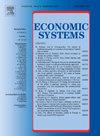Determinants of the choice of exchange rate regime in oil-exporting countries
IF 3.3
2区 经济学
Q1 ECONOMICS
引用次数: 0
Abstract
This study examines the factors that determine exchange rate regime choice in oil-exporting countries. We run ordered logit regressions for an unbalanced panel dataset of 138 countries covering 1974–2021 and confirm that oil-exporting countries are more likely to adopt a fixed exchange rate regime than other countries. The main reason for this is that, given the volatility and uncertainty of oil revenues, traditional monetary policy tools are ineffective, resulting in the exchange rate serving as a nominal anchor. This is supported by our findings on the distinct roles of output volatility, government spending, fiscal cyclicality, and central bank independence in determining exchange rate regimes in oil-exporting countries.
石油出口国汇率制度选择的决定因素
本研究考察了决定石油出口国汇率制度选择的因素。我们对涵盖1974-2021年的138个国家的不平衡面板数据集进行了有序logit回归,并证实石油出口国比其他国家更有可能采用固定汇率制度。主要原因是,考虑到石油收入的波动性和不确定性,传统的货币政策工具是无效的,导致汇率成为名义锚。我们对产出波动性、政府支出、财政周期性和央行独立性在决定石油出口国汇率制度中的独特作用的研究结果支持了这一点。
本文章由计算机程序翻译,如有差异,请以英文原文为准。
求助全文
约1分钟内获得全文
求助全文
来源期刊

Economic Systems
ECONOMICS-
CiteScore
4.90
自引率
0.00%
发文量
83
审稿时长
48 days
期刊介绍:
Economic Systems is a refereed journal for the analysis of causes and consequences of the significant institutional variety prevailing among developed, developing, and emerging economies, as well as attempts at and proposals for their reform. The journal is open to micro and macro contributions, theoretical as well as empirical, the latter to analyze related topics against the background of country or region-specific experiences. In this respect, Economic Systems retains its long standing interest in the emerging economies of Central and Eastern Europe and other former transition economies, but also encourages contributions that cover any part of the world, including Asia, Latin America, the Middle East, or Africa.
 求助内容:
求助内容: 应助结果提醒方式:
应助结果提醒方式:


